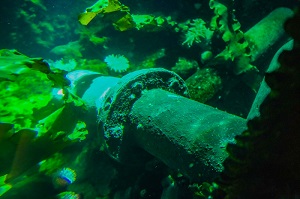Seismologists Detected Blast-Like Waves Near Broken Baltic Sea Pipeline
(Reuters) — Nordic and Baltic seismologists said that they had detected blast-like waves on Sunday when a Baltic Sea gas pipeline ruptured but that the data was not strong enough to determine whether explosives were involved.
Authorities in Finland and Estonia, whose state-run companies own and operate the Balticconnector pipeline, have said that the damage appeared to be caused by "mechanical force" and that it may have been a deliberate act.
Norwegian seismology institute NORSAR, analyzing data collected in Finland, said it identified "a probable explosion" near the pipeline on Sunday at 0120 EET (2220 GMT Saturday), matching operator Gasgrid's statement that pressure fell before 0200 EET.
Waves measured after explosions tend to leave different signals to those sent out by earthquakes, the seismologists said.
"We know that it wasn't an earthquake and we know there was an explosion but what actually caused the explosion is something to be further investigated," NORSAR CEO Anne Strommen Lycke told Reuters.
"We have seen that there is speculation about whether some ship could have dragged the pipeline and that (this) caused a hole and then a subsequent explosion (but) that is too early to tell," she said.
Finland's National Bureau of Investigation on Wednesday said that external marks were found on the seabed beside the pipeline and that it was reviewing the movements of vessels and that anchor damage was a potential explanation.
The agency said mechanical damage and not an explosion looked like the most likely cause of the incident but a blast had not been ruled out.
With a magnitude of around 1, the seismic signal detected was significantly weaker than minor earthquakes or the biggest of the explosions that last year ripped open the larger Nord Stream gas pipelines, which NORSAR said had a 2.3 magnitude.
But processing the data had separated the seismic waves from the background noise even though stormy weather in the Gulf of Finland, an arm of the Baltic Sea stretching eastwards into Russian waters, had complicated the analysis, seismologists said.
"What we are seeing is a seismic signal which originates in the Gulf of Finland at this time and it has some characteristics that at least make it possible or likely that it is a blast," seismologist Bjorn Lund at Sweden's University of Uppsala said.
Seismologist Jari Kortstrom at the University of Helsinki said the seismic data "might be an explosion", while Estonian seismologist Heidi Soosalu said the signals likely showed a "man-made event".
In 2022, the Nord Stream gas pipelines under the Baltic Sea between Russia and Germany were damaged by explosions that authorities have determined were caused by deliberate acts of sabotage.
NORSAR said the site of Sunday's seismic signal was likely located less than five kilometers from Nord Stream.
"Maybe we were fortunate that it didn't also do further damage to the Nord Stream pipelines," NORSAR's Lycke said.
Related News
Related News

- Enbridge Plans 86-Mile Pipeline Expansion, Bringing 850 Workers to Northern B.C.
- Intensity, Rainbow Energy to Build 344-Mile Gas Pipeline Across North Dakota
- U.S. Moves to Block Enterprise Products’ Exports to China Over Security Risk
- 208-Mile Mississippi-to-Alabama Gas Pipeline Moves Into FERC Review
- Court Ruling Allows MVP’s $500 Million Southgate Pipeline Extension to Proceed
- U.S. Pipeline Expansion to Add 99 Bcf/d, Mostly for LNG Export, Report Finds
- A Systematic Approach To Ensuring Pipeline Integrity
- 275-Mile Texas-to-Oklahoma Gas Pipeline Enters Open Season
- LNG Canada Start-Up Fails to Lift Gas Prices Amid Supply Glut
- Kinder Morgan Gas Volumes Climb as Power, LNG Demand Boost Pipeline Business





Comments